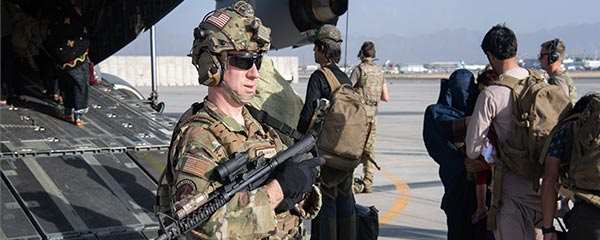PRINCETON, NJ -- As Gen. David Petraeus takes charge of U.S. forces in Afghanistan, the majority of Americans like him personally while at the same time viewing the conflict there as going badly for the U.S.
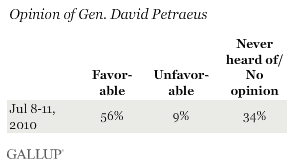
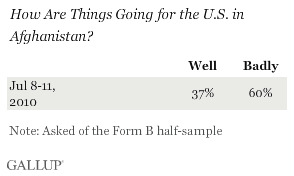
President Obama appointed Petraeus as commander of U.S. and International Security Assistance forces in Afghanistan on June 23, shortly after Gen. Stanley McChrystal was removed from the same position. The new Gallup data, from a poll conducted July 8-11, underscore Americans' positive opinions of the new commander, even as they recognize the challenge he faces in his new position.
Petraeus spent the last two years as commander of the U.S. Central Command. His overall name recognition (the percentage of Americans who know enough about him to have an opinion) is down from where it was in 2007, when he was commander in Iraq, overseeing the highly visible and controversial "surge" in American troops. Still, Petraeus' image is now more positive on a relative basis among those who have an opinion of him.
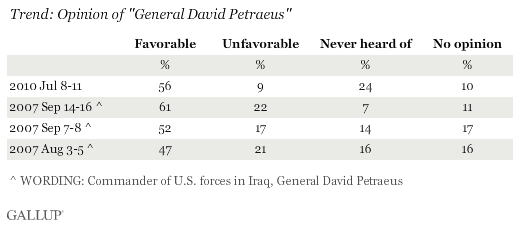
Things Still Going Badly in Afghanistan
The majority of Americans believe that things are going badly for the U.S. in Afghanistan, as has been the case in most Gallup polls conducted over the past four years.
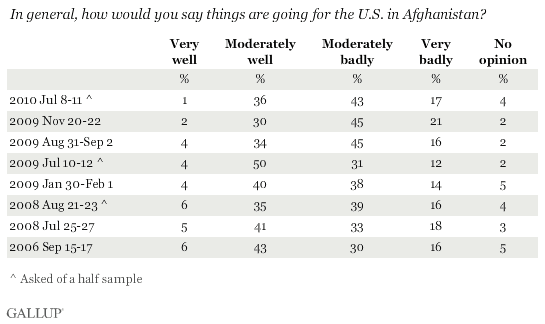
At the same time, Americans largely support the war effort. Less than a majority of Americans -- 38% -- say it was a mistake for the U.S. to have sent military forces to Afghanistan in the first place; 58% disagree.
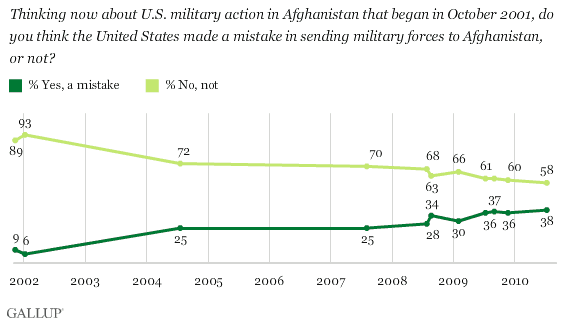
This "mistake" percentage is largely unchanged from several polls conducted in the summer and fall of 2009. In January 2002, shortly after troops were initially sent to Afghanistan in the aftermath of the Sept. 11, 2001, terrorist attacks, a much smaller 6% of Americans said U.S. involvement there was a mistake.
Bottom Line
Gallup finds both good news and bad news for Gen. Petraeus in this July 8-11 poll. He takes his new job as commander of U.S. and allied forces in Afghanistan with a remarkably positive image among Americans who know who he is. At the same time, Petraeus now faces the additional challenge of commanding a mission that the majority of Americans say is going badly. Americans' views of the situation in Iraq improved during and after Petraeus' tenure as commander in that country. The degree to which Petraeus will be able to shift Americans' perceptions of the war in Afghanistan in similar fashion will have important consequences in many arenas, including the politics of the war in the U.S.
Results for this Gallup poll are based on telephone interviews conducted July 8-11, 2010, with a random sample of 1,020 adults, aged 18 and older, living in the continental U.S., selected using random-digit-dial sampling.
For results based on the total sample of national adults, one can say with 95% confidence that the maximum margin of sampling error is ±4 percentage points.
For results based on the sample of 492 national adults in Form B, one can say with 95% confidence that the maximum margin of sampling error is ±5 percentage points.
Interviews are conducted with respondents on landline telephones (for respondents with a landline telephone) and cellular phones (for respondents who are cell phone-only). Each sample includes a minimum quota of 150 cell phone-only respondents and 850 landline respondents, with additional minimum quotas among landline respondents for gender within region. Landline respondents are chosen at random within each household on the basis of which member had the most recent birthday.
Samples are weighted by gender, age, race, education, region, and phone lines. Demographic weighting targets are based on the March 2009 Current Population Survey figures for the aged 18 and older non-institutionalized population living in continental U.S. telephone households. All reported margins of sampling error include the computed design effects for weighting and sample design.
In addition to sampling error, question wording and practical difficulties in conducting surveys can introduce error or bias into the findings of public opinion polls.
View methodology, full question results, and trend data.
For more details on Gallup's polling methodology, visit https://www.gallup.com/.
